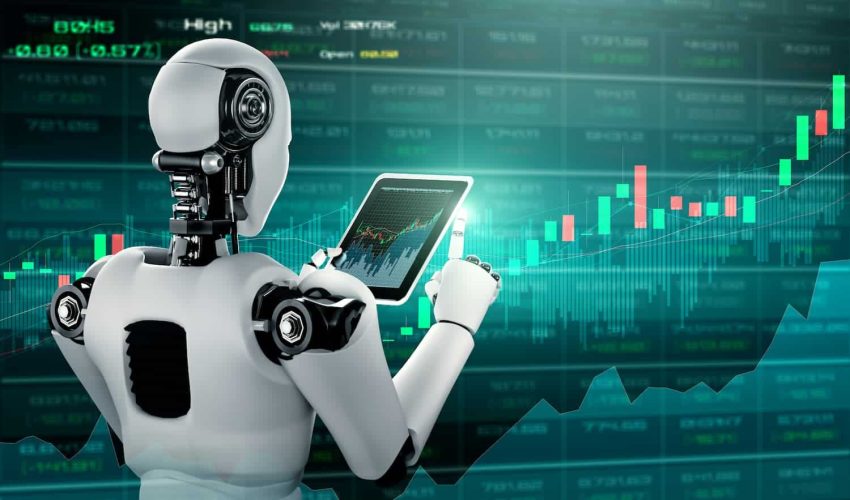Artificial Intelligence (AI) has revolutionized the world of investment and trading and investment management, providing unprecedented capabilities to analyze huge quantities of data, spot patterns, and take informed trading decisions quickly and with precision. Thanks to the advancement of machines learning techniques, neural networks as well as natural language processing methods, AI has become an essential instrument for asset managers, traders as well as financial institutions that want to increase their competitiveness in the ever-changing market of financial markets. This article we’ll look at the role played by artificial intelligence (AI) in trades, its application advantages, limitations, and the potential for its transformational impact in shaping the direction of investing.
A Trading With Artificial Intelligence: The Future Of Investments:
AI Applications in Trading:
Artificial intelligence is utilized in many aspects of trading including algorithmic trading, quantifiable analysis of risk as well as portfolio management. Algorithmic trading, also referred to as automated trading or algo-trading uses Artificial intelligence powered algorithms in order that execute trade orders with high speed and frequency, while leveraging market information, price patterns, as well as technical indicators, to find promising trading options. These algorithms are able to execute trades efficiently and with precision by removing human error and emotional repercussions out of the trading process.
Quantitative analysis, which is a important method of using AI for trading is the use of mathematical models, machine learning algorithms and data analytics techniques to analyse financial data, find patterns, and design strategies for trading. AI algorithms can process massive quantities of market data from the past such as news articles, news stories as well as social media content and other pertinent information to provide insights on market developments and take trades based on data. Additionally AI-powered risk management systems can evaluate risk to portfolios and identify threats and develop risk mitigation strategies immediately aiding investors in managing risks and safeguard capital.
Benefits of AI in Trading:
The use of artificial intelligence into trading can bring benefits to traders, investors and financial institutions. One of the major benefits is the improved decision-making capabilities because AI algorithms can analyze massive amounts of data, recognize complicated patterns, and provide immediate insights that can be used in the real time. Utilizing the machine-learning algorithms used by traders, they are able to find trading opportunities, improve trade execution and reduce risk more efficiently which results in improved efficiency and profitability in trading.
Furthermore, AI-powered trading systems are able to operate 24 hours a day, constantly monitoring market conditions, performing trades, digital transformation, and altering trading strategies in response to changing market dynamic. This enables traders to capitalize upon market-driven opportunities, and to react quickly to market conditions that change and without being hampered by human limitations such as emotion or fatigue. Furthermore, AI algorithms can adapt and learn from previous trading experiences, and refine its strategies as time passes in order to adjust to market conditions that change and enhance efficiency.
Challenges of AI in Trading:
Although artificial intelligence can bring substantial benefits to trading, it does present many risks and issues which need to be dealt with. One of the biggest challenges is the quality of data and its availability because AI algorithms depend on huge quantities of high-quality data in order to make precise predictions and decision-making. Incomplete or poor quality data could lead to flawed models, incorrect forecasts, and inefficient trading decisions. Additionally, AI-powered trading systems are prone to overfitting in which algorithms work well with previous data, but fail adapt to the latest data or market conditions in real-time.
Another issue is transparency and model interpretability The complexity of AI algorithms are often difficult to interpret and comprehend which makes it difficult for regulators and traders alike to analyze their decision-making processes and the results. Transparency issues can cause distrust of AI-powered systems for trading, and raise questions about the biases of algorithms fairness, accountability, and fairness. Additionally, cybersecurity threats and data breaches pose serious risk to AI-powered trading platforms since malicious actors can exploit weaknesses for manipulating markets snatch sensitive data or disrupt trading.
Future Trends in AI Trading:
Despite the dangers and challenges however, what’s to come for AI in trading appears promising, with ongoing advances with machine learning, analytics methods and the power of computers that are driving the development of technology in the sector. The future developments in AI trading will likely concentrate on improving model interpretability and transparency, as well as improving the quality and accessibility of data as well as dealing with ethical and regulatory concerns. It is possible to explain AI methods, like interpretable models of machine learning and interpretability tools that are model-agnostic, seek to increase clarity and the ability to interpret AI algorithms, which will allow traders and regulators to comprehend the process of making decisions and to evaluate biases in algorithms.
Additionally, improvements in data analysis as well as natural language processing and the analysis of sentiment are predicted to enhance the quality and accessibility of data to AI trade models. AI algorithms will use different sources of data like satellite images feeds from social media marketing sites as well as the internet of things (IoT) sensor data, in order to gain more understanding of market trends and sentiment of investors. In addition, the rules and regulations regarding AI-powered systems for trading are expected to change to address issues regarding transparency, fairness and integrity of the market as well as ensuring ethical and responsible usage in the use of AI for trading.
Transformative Potential of AI in Investments:
Artificial intelligence is poised to revolutionize the world of investment, providing new opportunities for asset managers, investors and financial institutions to improve investments, manage risk and improve the performance of portfolios. Robotic advisors and investment platforms powered by AI are opening up access to investment advice as well as portfolio management services. They provide individual investment recommendations as well as automated portfolio rebalancing with lower cost. Additionally, AI algorithms can analyze huge quantities in market information, spot new trends and create an increase in alpha by leveraging market inefficiencies and incorrect pricing.
Additionally AI-driven investment strategies like factor-based investing and smart beta strategies and quant hedge funds, are becoming popular among investors from both retail and institutional looking to earn higher risk-adjusted returns. These strategies employ AI algorithms to detect the elements and patterns that influence asset prices and improve the structure of portfolios to meet specific goals in investment. Utilizing the capabilities of artificial intelligence investors gain insight into market trends, take investments based on data, and navigate the complex dynamics of markets without fear, opening up new opportunities to create value and wealth creation.
Conclusion:
Artificial intelligence is changing the future of investing with its unprecedented ability to study data, spot patterns, and take informed trading decisions quickly and with precision. While AI-powered trading has its own issues and risks but its advantages, such as higher decision-making capability, better trading performance, and transformational potential is driving its acceptance across the financial sector. As advances in AI algorithms as well as data analytics techniques regulations continue change and evolve, it is likely that the next generation of AI in trading has promise for traders, investors, as well as financial institutions that want to improve their competitiveness and improve investment performance in the ever-changing market that is the world of finance.

